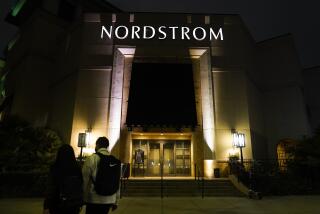Sears chairman worked his way up
Edward Brennan, the last home-grown chairman to lead Sears, Roebuck and Co., died Thursday night at his home in Burr Ridge, Ill., after a brief illness. He was 73.
A member of Chicagoâs tightly knit business elite, Brennan continued to play a high-profile role in the corporate world after he retired from Sears more than a decade ago. He served as an independent director on a number of boards, among them McDonaldâs Corp.
Brennan was known for being calm under pressure and stepping forward when companies were in trouble. He was a director at American Airlines when the carrier was on the verge of bankruptcy in 2003.
After Chief Executive Donald Carty abruptly resigned, fellow board members tapped Brennan to become Americanâs executive chairman and president. In his year as executive chairman, he helped American avoid Chapter 11, a fate that had befallen United Airlines.
âHe was always prepared to step in and help in a crisis situation,â said John Madigan, former chief executive of Tribune Co. and Brennanâs friend.
Andrew McKenna, a close friend and chairman of McDonaldâs, said, âYou couldnât have a better listener, anyone with sounder advice. He was at his best in difficult times.â
Brennan definitely had Sears in his blood, although whether he presided over the beginning of the companyâs downfall is still a source of debate among retail experts.
Born in Chicago on Jan. 16, 1934, Brennan graduated from Marquette University in the 1950s and joined Sears, selling menâs furnishings in Madison, Wis. He followed in the footsteps of his father, four uncles and a grandfather who had worked beside founder Richard Sears.
Brennan quickly rose through the ranks, moving his family more than a dozen times.
In 1980, he returned to Chicago to become president of the Sears Merchandise Group. Four years later, he became corporate president and chief operating officer, and in 1986 he became chairman and chief executive of Sears, Roebuck and Co.
Brennanâs critics contend that he was slow to respond to the threat posed by discount chains, particularly Wal-Mart, which would eventually replace Sears as the nationâs largest retailer. Despite several strategy shifts, Searsâ growth stalled.
âThe retail business changed more under Ed than under many of the previous chairs. Sears was just keeping on, keeping on,â said veteran Chicago retail consultant Sid Doolittle. âIn hindsight, he was slow to make radical changes. Sears could have done something during his regime that would have put them in a better position to compete in a changing world. But itâs hard to say that anyone saw that at that time.â
Brennan also was part of the management team that built Sears into a financial conglomerate by acquiring real estate brokerage Coldwell Banker and financial services firm Dean Witter. By adding them to the companyâs existing Allstate insurance unit, Sears sought to become a one-stop shop for everything from mattresses to stocks.
The financial businesses prospered, but the synergies with retailing never materialized. In the early 1990s, Brennan oversaw the dismantling of the financial empire through spinoffs and sales, generating large returns for investors. He also recruited his successor, Saks Fifth Avenue executive Arthur Martinez, to head Searsâ retail side.
After leaving the company, Brennan emerged as a high-powered independent director at corporate boards in the United States. He also served as chairman of the board at Marquette and DePaul universities. Last year, Dominican University in River Forest, Ill., renamed its business school in honor of Brennan and his wife, who was a student there when they were dating.
Brennan played an important civic role at Rush University Medical Center in Chicago. As chairman of the board at the teaching hospital, Brennan reversed financial losses, recruited a chief executive and shored up morale among the medical staff.
âWhen Ed took over, Rush was facing some very serious financial challenges,â said Dr. Larry Goodman, Rush president and chief executive. âDuring his tenure, we really turned that around.â
Brennan insisted that Rush not abandon its social mission of serving a racially and economically diverse community, Goodman said. âHe understood patient care was the most important thing we provided.â
Brennan is survived by his wife, Lois, six children and 19 grandchildren.
A funeral Mass will take place at 10 a.m. today at Old St. Patrickâs Church in Chicago. Burial will be private.
More to Read
Inside the business of entertainment
The Wide Shot brings you news, analysis and insights on everything from streaming wars to production â and what it all means for the future.
You may occasionally receive promotional content from the Los Angeles Times.










